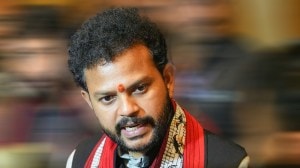
Election Commission says ready to roll out pilot for migrants to vote remotely
Syllabus:
Preliminary Examination: Current events of national and international importance.
Mains Examination: General Studies II: Salient features of the Representation of People’s Act.
Key Points to Ponder:
• What’s the ongoing story- Underlining the problems faced by domestic migrants in travelling back to their home constituencies to vote, the Election Commission of India (ECI) Thursday said it is ready to pilot remote voting, a move that will also result in better voter turnouts. In a statement, the ECI said it has developed a multi-constituency Remote Electronic Voting Machine (RVM) that can facilitate voting for different constituencies from a single remote polling booth.
• Remote Electronic Voting Machine (RVM)-Know in detail
• “Migration based disenfranchisement is indeed not an option in the age of technological advancement”-Discuss
• Why Remote Electronic Voting Machine?
• Remote Electronic Voting Machine and Migrants enfranchisement-connect the dots
• What are the challenges associated with migrant voters?
• What does the term “domestic migrant” mean?
• Implementation of Remote Electronic Voting Machine-What are the Administrative, legal and technological challenges?
• What are the recent key electoral reforms proposed by Election Commission of India?
Story continues below this ad
• Election Commission of India and Article 324 of the Constitution-Know in detail
• The independent and impartial functioning of the Election Commission-How it is ensured?
• Election Commission of India- Powers and Functions
• System of Election- First past the post electoral system.
• How Elections are conducted in India?
• The Constitution of India has prescribed the qualifications (legal, educational, administrative or judicial) of the members of the Election Commission-True or False?
• The Constitution has not specified the term of the members of the Election Commission-True or False?
Story continues below this ad
• Chief Election Commissioner and the two other Election Commissioners have equal powers-True or False?
• In case of difference of opinion amongst the Chief election commissioner and/or two other election commissioners,
the matter is decided by the Supreme Court of India-Right or Wrong?
Other Important Articles Covering the same topic:
📍ECI ready to pilot remote voting for domestic migrants; migrant voter need not travel back to home state to vote
Karnataka reclassifies Vokkaligas, Lingayats to increase their share of OBC quota
Syllabus:
Story continues below this ad
Preliminary Examination: History of India and Indian Polity and Governance-Constitution, Political System, Panchayati Raj, Public Policy, Rights Issues, etc.
Mains Examination: General Studies II: Government policies and interventions for development in various sectors and issues arising out of their design and implementation.
Key Points to Ponder:
• What’s the ongoing story-The Karnataka Cabinet Thursday decided to categorise the two dominant communities in the state, Vokkaligas and Lingayats, as “moderately backward” from the “backward” category in a move that could increase their share in reservation for Other Backward Classes (OBC).
• Who are the Lingayats and Vokkaligas?
• Vokkaligas and Lingayats-Know in detail
• Why the Karnataka Cabinet decided to categorise the two dominant communities in the state, Vokkaligas and Lingayats, as “moderately backward” from the “backward” category in a move that could increase their share in reservation for Other Backward Classes (OBC)?
Story continues below this ad
• For Your Information-The Lingayats are a dominant community who make up nearly 17% of Karnataka’s six crore population . The community can determine the outcome of polls in as many as 90-100 of the state’s 224 Assembly constituencies. The Lingayats, classified as a Hindu sub-caste called Veerashaiva Lingayats, are essentially followers of the 12th-century philosopher Saint Basavanna, who started a movement to help sections of society break away from the chains of caste.
• How are they politically aligned?
• What is the current controversy?
• What are the political ramifications?
• Personality in News-Basaveshwara
Other Important Articles Covering the same topic:
📍Vokkaligas, politics and symbolism: Why Kempegowda’s statue matters
📍A Lingayat sub-sect’s quota demand: context, implications
Rejuvenation of small rivers under NREGS highlight of PM meet today
Syllabus:
Preliminary Examination: Indian Polity and Governance-Constitution, Political System, Panchayati Raj, Public Policy, Rights Issues, etc.
Mains Examination: General Studies II: Government policies and interventions for development in various sectors and issues arising out of their design and implementation.
Key Points to Ponder:
Story continues below this ad
• What’s the ongoing story-THE CENTRE will showcase its initiative of rejuvenating around 75 small rivers, mainly in UP, over the past four years using funds under the national rural job guarantee scheme during the second meeting of the National Ganga Council, which will be held under the chairmanship of Prime Minister Narendra Modi in Kolkata.
• National Ganga Council-Know its composition
• Who heads National Ganga Council?
• Is National Ganga Council statutory body?
• What are the functions of the National Ganga Council (NGC)?
• What are the objectives of the National Ganga Council (NGC)?
• For Your Information-It will be the first meeting since 2019 of the Council, which is the apex authority responsible for cleaning the river and includes the Chief Ministers of Uttar Pradesh, Uttarakhand, Bihar, Jharkhand and West Bengal as members. The Council also includes several Union ministers, including the Finance Minister, Rural Development Minister and Power Minister.
• National Mission for Clean Ganga (NMCG)-Know in detail
Story continues below this ad
• What are the objectives of National Mission for Clean Ganga (NMCG)?
• What is the aim of National Mission for Clean Ganga (NMCG)?
Other Important Articles Covering the same topic:
📍Restoring the Ganga’s purity and biodiversity
THE EDITORIAL PAGE
Covid, three years later
Syllabus:
Preliminary Examination: General Science and Current events of national and international importance.
Mains Examination:
• General Studies II: Government policies and interventions for development in various sectors and issues arising out of their design and implementation.
Story continues below this ad
• General Studies III: Awareness in the fields of IT, Space, Computers, robotics, nanotechnology, bio-technology.
Key Points to Ponder:
• What’s the ongoing story- Chandrakant Lahariya Writes: The recent statement that ‘the next 40 days will be crucial’ is inferred from the patterns of previous Covid waves. Three years into the pandemic, the context has changed and past patterns are not a helpful guide for decision making.
• ‘The biggest and ongoing Covid-19 wave in China has started speculations about a fourth wave in India’-Where India stands right now?
• Is a fresh national Covid wave in India a real possibility?
• ‘A disease outbreak or an epidemic in any setting or country is the outcome of complex interactions between the “epidemiologic triad” of the agent, host and environment factors’-Elaborate
• In Covid-19, who is the agent, the hosts and what are the environmental/external factors?
• According to the Author, ‘a fresh national wave in India is possible only if there are major changes in one or more components of the epidemiologic triad’- What are those major changes in one or more components of the epidemiologic triad?
• Has the Covid wave in China changed the situation for India?
• ‘In the agent factor, Omicron (B.1.1.529) and its sub-lineages such as XBB, and BF.7 are spreading in China’- What do you know about B.1.1.529, XBB, and BF.7?
• India might see a surge in cases in January, citing patterns observed during previous waves-What patterns were observed during previous waves?
• What is reason for the explosive surge of Covid cases in China?
• “China’s definition of Covid deaths was too narrow”-What is exactly China’s policy on Covid?
• China Covid-19 surge: What’s happening?
• Covid surge: What was different in China?
• What steps were taken by the government of India to control the spread of Covid-19?
• What is the government doing about the potential surge in cases?
Other Important Articles Covering the same topic:
📍China estimates Covid surge infected 37 million people in a day
📍Concern over lack of Covid-19 info in China; villages get ready
THE IDEAS PAGE
A bond with a history
Syllabus:
Preliminary Examination: Current events of national and international importance.
Mains Examination: General Studies II: Bilateral, regional and global groupings and agreements involving India and/or affecting India’s interests.
Key Points to Ponder:
• What’s the ongoing story- Armen Sarkissian writes: The partnership between Armenia and India is not driven by governments alone. It is pushed forward to a great extent by ordinary people from both countries. Governments need to catch-up.
• India and Armenia-Historical Background
• Bilateral relations between India and Armenia-Know in detail
• Map Work-Armenia
• India’s stated policy of deepening defence cooperation with Armenia-Know in detail
• How deeper collaboration with Armenia will benefit India economically?
• Which nations are in the Caucasus region?
• Who was Shahamir Shahamirian?
• How is the level of bilateral trade and investments between India and Armenia?
• India has extended assistance to Armenia in the past from time to time-How and in what circumstances?
• Indian Diaspora in Armenia-Know in detail
Other Important Articles Covering the same topic:
📍INDIA – ARMENIA RELATIONS
ECONOMY
Why loan recovery via Lok Adalat has jumped four-fold?
Syllabus:
Preliminary Examination: Economic and Social Development-Sustainable Development, Poverty, Inclusion, Demographics, Social Sector Initiatives, etc.
Mains Examination: General Studies III: Indian Economy and issues relating to planning, mobilization, of resources, growth, development and employment.
Key Points to Ponder:
• What’s the ongoing story- THE NUMBER of non-performing assets (NPAs) referred by banks to various recovery channels, including Lok Adalat and the Insolvency and Bankruptcy Code (IBC) route, in 2021-22 witnessed a four-fold jump compared to 2020-21 as lakhs of small ticket loans were referred for resolution to Lok Adalats of banks.
• What is Lok Adalat for loan recovery?
• Why is there an increase in the number of cases?
• How many cases were referred to Lok Adalat?
• What is the progress in IBC cases?
• How have DRTs and SARFAESI routes fared?
• What is the Insolvency and Bankruptcy Code (IBC)?
Other Important Articles Covering the same topic:
📍UBI Strikes Gold With Lok Adalat Approach For Recovering Debt
For any queries and feedback, contact priya.shukla@indianexpress.com
The UPSC KEY Indian Express is now on Telegram. Click here to join our channel and stay updated with the latest Updates.


































